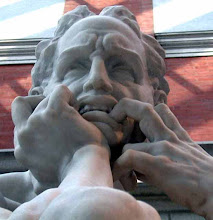
After a Fight on a Last February Wednesday
If I lost you
I would be like a lonely recidivist
sentenced to a place where there is nothing good
to touch or hear or see or taste.
If I lost you
the desperate psychopath,
would break in all over again,
out to steal this light.
Once beautiful together, have we
suddenly derailed,
lights dim and flashing red?
It’s true. I’ll beg.
Turn these bars to air, once more,
white crinolines fluttering in spring,
breezy lace curtains
shadows hopping sprite-like in
the light of you.
* * * * * * *
What is it about this woman, other than the fact I find her mesmerizingly beautiful?
Even her soft laughter—beautiful. But also tender. Its sound is worked into her anger like a vein of running water. Her eyes—beautiful too, beguiling. Within their translucent hues she hides and discloses all at once.
Her reticences are part of that same confusing lack of finality. If I wait she will arrive. But, I still talk over her, never meaning to. Her voice bubbles up in starts and stops, and I haven’t learned their cadence quite yet. Listen, John. Listen.
The insights she shares speak intelligently about the multifarious world. I think she and I share a plane of experience. We see the world, not exactly alike, but in much the same way. We have felt the sting of fear and the staunch courageous stand. We have felt the surge of anger in the blood and the tender drift of caring that unfolds in tears.
“We.” It is that one personal pronoun that speaks to our pluralities. Old familiars occupy the space between when we sit around coffee, always too strong. Perhaps our feelings have been brewed that way as well. Her silences are movements of the self, her words are rungs to climb. She encourages me to rest, inspires me to action. I can be who I am with her. She can be who she is round here. And, I guess, we will sometimes fight as well.
